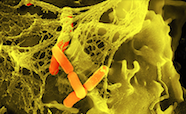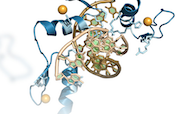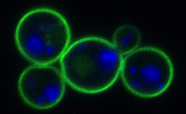Mātai Hāora – Centre for Redox Biology and Medincine
(Formerly the Centre for Free Radical Research)

We carry out research on the regulation of oxidative stress and redox metabolism in cancer cells, and how these pathways may be manipulated to assist treatment.
Research Projects:
- Alterations in the redox metabolism of cancer cells during metastasis and the development of drug resistance
- Targeting the antioxidant systems of cancer cells
- Vitamin C and the regulation of cancer cell epigenetics
- Role of innate immune cells in the promotion and progression of cancer
- Regulation of cell death pathways
Email mark.hampton@otago.ac.nz
Web otago.ac.nz/free-radical
Department of Biochemistry

Our research groups use a variety of approaches to understand how disease occurs, including molecular genetics and bioinformatics, protein structural biology and cell biology techniques.
We study the infectious agents behind a range of diseases:
- Professor Kurt Krause - The structural biology of infectious diseases, particularly targets from Mycobacterium tuberculosis, including enzymes involved in bacterial cell wall synthesis, like alanine racemase and glutamate racemase, and from poxviruses including immunomodulating factors such as chemokine binding proteins
- Professor Iain Lamont - Pseudomonas aeruginosa bacteria, which cause lung infections in patients with cystic fibrosis
- Dr Chris Brown - viruses including hepatitis B
Please visit the Department of Biochemistry's research pages to find out more:
Biochemistry research at Otago: Genetic and molecular basis of disease
Our staff also belong to wider topic-based research centres and themes in the University.
- Agriculture at Otago
- Genetics Otago
- Genomics Aotearoa
- Otago Global Health Institute
- Webster Centre for Infectious Diseases
Email biochemistry@otago.ac.nz
Web otago.ac.nz/biochemistry/research
Department of Microbiology and Immunology
 Please visit our Research Overview page for the specific research interests and expertise of our staff who work in the disciplines listed.
Please visit our Research Overview page for the specific research interests and expertise of our staff who work in the disciplines listed.
Immunology
Our department hosts a community of research groups involved in the study of a wide range of topics, from fundamental immunology and applied research on clinical and veterinary biomarkers through to vaccine development. Our research staff and students are experts in immunology, cell biology, blood and lymphatic systems.
Infectious disease-related work:
Microbiology
Our internationally recognized researchers and their teams are investigating areas central to microbiology, both fundamental and applied. Diverse techniques spanning genetics, molecular biology and biochemistry are used to understand the environmental role of microbes, including viruses, host-microbe interactions that underpin both beneficial and disease processes in plants and animals, and to develop new biotechnologies.
Infectious disease-related work:
Parasitology
Our laboratory focuses on the biology of the parasite Plasmodium vivax (the cause of vivax malaria) and how we can kill it using therapeutics or vaccinations. In addition to vivax malaria we also investigate the biology and epidemiology of protozoal parasites of importance to human health in New Zealand.
Virology
We have a vibrant virology community undertaking both basic and applied virology. Understanding virus-host interactions, engineering vaccines, the discovery of virus-derived bioactive molecules and identification of targets for antivirals are all key research areas. Our successful and active virology groups are supported by a collegial approach to research that benefits both staff and students.
Infectious-disease-related research collaborations
Research staff of the department collaborate with many other University of Otago researchers in the form of research themes or centres:
- Agriculture at Otago
- Genetics Otago
- One Health Aotearoa
- Otago Global Health Institute
- Webster Centre for Infectious Disease
Email microbiology@otago.ac.nz
Web micro.otago.ac.nz/research/research-overview/
Department of Pathology
 Focused on excellence in both research and teaching, the Department of Pathology is dedicated to investigating the cause of human disease, to applying our knowledge to improve the treatment of patients, and to share that knowledge with others.
Focused on excellence in both research and teaching, the Department of Pathology is dedicated to investigating the cause of human disease, to applying our knowledge to improve the treatment of patients, and to share that knowledge with others.
Human Papillomavirus (HPV)
The Hibma Laboratory, within the Department of Pathology, is aiming to better understand the biology of human papillomavirus (HPV), particularly the interplay between the virus and the host immune system.
Cervical cancer is caused by infection with high-risk, cancer-causing types of HPV. HPV is also associated with around 30% of head and neck cancers, and may contribute to cutaneous squamous cell carcinoma.
Email merilyn.hibma@otago.ac.nz
Web otago.ac.nz/dsm-pathology/research/hibma-laboratory.html
Department of Pharmacology and Toxicology
 State-of-the-art technologies, including the use of in-vivo disease models, are used to undertake integrative, cellular and molecular investigations aimed at understanding animal and human pathophysiology (and to delineate targets for novel drugs).
State-of-the-art technologies, including the use of in-vivo disease models, are used to undertake integrative, cellular and molecular investigations aimed at understanding animal and human pathophysiology (and to delineate targets for novel drugs).
Wound healing and virology
Associate Professor Lyn Wise trained as a molecular virologist and was a key researcher in the functional characterisation of the viral family of vascular endothelial growth factors and a range of anti-inflammatory factors encoded by the parapoxviruses.
Her research currently focuses on microbial manipulation of the inflammatory, vascular and wound healing responses in the skin, and the use of bio-therapeutics for skin wounds, infections and inflammatory disorders.
Email lyn.wise@otago.ac.nz
Web otago.ac.nz/phal/people/profile?id=307
Genetics Otago
 Genetics Otago is the largest centre for advanced genetics research in Australasia, with researchers and facilities covering the full spectrum of genetics research. In relation to infectious diseases our research includes:
Genetics Otago is the largest centre for advanced genetics research in Australasia, with researchers and facilities covering the full spectrum of genetics research. In relation to infectious diseases our research includes:
- Applied genetics research
Our researchers are at the forefront of selecting and producing new traits for biologically-based industries. These industries are the backbone of the New Zealand economy. - Developmental genetics research
We study genes and development in numerous vertebrates and invertebrates. We work to identify genes associated with human developmental disease, and on epigenetics, and human and plant biology. - Microbial research
Our researchers study the biology of these organisms, including how viruses interact with other organisms and the immune system, and how they might be harnessed to deliver health benefits.
Email go@otago.ac.nz
Web otago.ac.nz/genetics/nz/
Genomics Aotearoa
 Genomics Aotearoa is an agile, leading-edge and collaborative platform, established to ensure that New Zealand is internationally participating and leading in the rapidly developing fields of genomics (the study of the genome, the complete set of genetic material present in a cell or organism) and bioinformatics (the development of methods and software tools for understanding the biological data derived from genomics).
Genomics Aotearoa is an agile, leading-edge and collaborative platform, established to ensure that New Zealand is internationally participating and leading in the rapidly developing fields of genomics (the study of the genome, the complete set of genetic material present in a cell or organism) and bioinformatics (the development of methods and software tools for understanding the biological data derived from genomics).
Genomics Aotearoa is an alliance of nine partners:
- Universities - Auckland, Massey, Otago, Victoria, Waikato
- Crown Research Institutes - AgResearch, ESR, Landcare Research, Plant & Food
It also has over 30 associates - organisations that are researchers or end users of genomics and bioinformatics.
Email genomics.aotearoa@otago.ac.nz
Web www.genomics-aotearoa.org.nz
One Health Aotearoa
 One Health Aotearoa is an alliance of New Zealand's leading infectious diseases researchers committed to working together to address important health hazards in New Zealand, and beyond.
One Health Aotearoa is an alliance of New Zealand's leading infectious diseases researchers committed to working together to address important health hazards in New Zealand, and beyond.
A key lesson from recent infectious diseases outbreaks, including Ebola in West Africa, and efforts to control antimicrobial resistance, is that now, more than ever, we need to work across sectors, and reverse the trend towards increasing compartmentalization. Importantly, issues are addressed in a real-world context, with early involvement of key stakeholders and easier translation into policy.
Visit our website for more about our integrative approach to understanding, preventing, and controlling infectious diseases including:
Email: one.health@otago.ac.nz
Web: onehealth.org.nz
Otago Genomics Facility
 We provide expertise and sequencing resources to New Zealand researchers and industry including:
We provide expertise and sequencing resources to New Zealand researchers and industry including:
- Project design and advice
- Illumina HiSeq sequencing
- Illumina MiSeq sequencing
- Nanostring nCounter Analysis System
The Otago Genomics Facility is an Illumina Propel-certified service provider for Illumina HiSeq 2500 and MiSeq sequencing platforms, and is also a Nanostring nCounter Analysis System core facility.
Email genomics@otago.ac.nz
Web otago.ac.nz/genomics
Otago Global Health Institute (OGHI)
 We aim to improve global health and save lives, by identifying and evaluating solutions to important health problems in low-resource settings.
We aim to improve global health and save lives, by identifying and evaluating solutions to important health problems in low-resource settings.
We work to address the world's most pressing health problems through research collaborations with low- and middle-income countries, and with disadvantaged groups in New Zealand.
We draw upon New Zealand's unique connections with Asia and the Pacific. Our extensive international partnerships and cross-disciplinary collaborations enable us to carry out innovative and rigorous research to advance global health.
Visit OGHI Selected projects to read more about:
- e-ASIA Joint Research Program: Whole genome sequencing of drug-resistant Mycobacterium tuberculosis strains.
- e-ASIA Joint Research Program: Collaborative fever etiology research in Southeast Asia.
- The implications for migration and trade on the presence of infectious and nutritional diseases in past populations in Asia
- Collaboration between the University of Otago and the University of Medicine 1, Yangon, Myanmar: Febrile illness, invasive bacterial disease, and antimicrobial resistance among inpatients in Myanmar.
- Latent tuberculosis infection among health care workers.
- Socioeconomic risk factors for childhood pneumonia in Basse, The Gambia.
- Faculty of Medicine in Universitas Padjadjaran: Concurrent Tuberculosis and Diabetes Mellitus (TANDEM) in Indonesia.
- Bill & Melinda Gates Foundation: Severe typhoid in Tanzania (STT).
- Bill & Melinda Gates Foundation: Invasive Salmonella infections in Africa.
- Bill & Melinda Gates Foundation: Typhoid Vaccine Acceleration Consortium (TyVAC).
- UK Biotechnology and Biological Sciences Research Council: The impact and social ecology of bacterial zoonoses in northern Tanzania.
- UK Biotechnology and Biological Sciences Research Council: Hazards Associated with Zoonotic enteric pathogens in Emerging Livestock meat pathways (HAZEL).
- UK Biotechnology and Biological Sciences Research Council: Social, Economic and Environmental Drivers of Zoonoses in Tanzania (SEEDZ).
- UK Biotechnology and Biological Sciences Research Council: Molecular epidemiology of brucellosis in northern Tanzania.
- US National Institutes of Health: Investigating Febrile Deaths in Tanzania (INDITe).
- US National Institutes of Health: The impact and social ecology of bacterial zoonoses in northern Tanzania.
Email globalhealth@otago.ac.nz
Web otago.ac.nz/global-health
Otago Micro and Nanoscale Imaging (OMNI)
 Four well-established and highly respected research-expertise providers have joined together under one umbrella to offer:
Four well-established and highly respected research-expertise providers have joined together under one umbrella to offer:
All the expertise, highly sophisticated instrumentation, and stellar support remains in place, as do the existing locations of services on our Dunedin campus.
The four units have collaborated on a new website as a central repository of their capabilities and achievements.
For all you need to know about what can be offered, who can help, what services, training, and specialist expertise and advice is available, please contact us.
Email omni@otago.ac.nz
Web otago.ac.nz/omni
Research Infrastructure Centre
 Our Research Infrastructure Centre offers specialist expertise, technology and facilities in protein research, genomics, imaging, and biomedical research.
Our Research Infrastructure Centre offers specialist expertise, technology and facilities in protein research, genomics, imaging, and biomedical research.
We support optimum design and analysis of your research, and provide skill development opportunities.
Our academic leadership is of the highest calibre and we have extensively experienced and skilled staff.
Our services are available to researchers in institutions, industry, government and private companies.
Email ric.admin@otago.ac.nz
Web otago.ac.nz/healthsciences/research/ric
Sir John Walsh Research Institute (Oral health)
 Our institute has two programme areas with research related to infectious diseases:
Our institute has two programme areas with research related to infectious diseases:
Clinical and translational research
We focus on studies of direct clinical relevance as well as the translation of basic research into clinical practice with the objective of delivering better and more efficient treatments including:
- Manuka honey antibacterial action against childhood caries
- Manuka honey and Manuka oil antibacterial action against periodontitus
- Silver nano-particles as antibacterial agents
- Prescription of systemic antibiotics by dental specialists
- Cross-infection control practices in New Zealand dental practices
Molecular microbiology
Oral microbes cause disease in a large proportion of our population. In the Molecular Microbiology programme we study how the diseases are caused and how we can prevent or overcome them. Our research includes:
- Structure-directed antimicrobial discovery
- Candida adherence and drug resistance
- Oral bacteriology
- Microbial profiling and bacterial genome sequencing
Email sjwri.admin@otago.ac.nz
Web otago.ac.nz/sjwri/research
Webster Centre for Infectious Diseases
 Our primary mission is to provide molecular solutions to problems in infectious diseases through the application of modern methods of molecular and translational research. In turn, we hope that this progress will lead to the development of new vaccines, diagnostics and antimicrobials.
Our primary mission is to provide molecular solutions to problems in infectious diseases through the application of modern methods of molecular and translational research. In turn, we hope that this progress will lead to the development of new vaccines, diagnostics and antimicrobials.
Members of the Webster Centre use a variety of methods in their research, ranging from chemistry, biochemistry, molecular biology, bioinformatics, immunology and microbiology.
Key research:
- Applied and molecular immunology
- Bacterial physiology and antimicrobial resistance
- Human virology: human papillomavirus
- Human virology: influenza virus
- Immunity to bacterial infection
- Oral microbiology and antifungal drug resistance
- Pseudomonas in kiwifruit
- Structural biology of infectious diseases
Email webstercentre@otago.ac.nz
Web otago.ac.nz/webster
